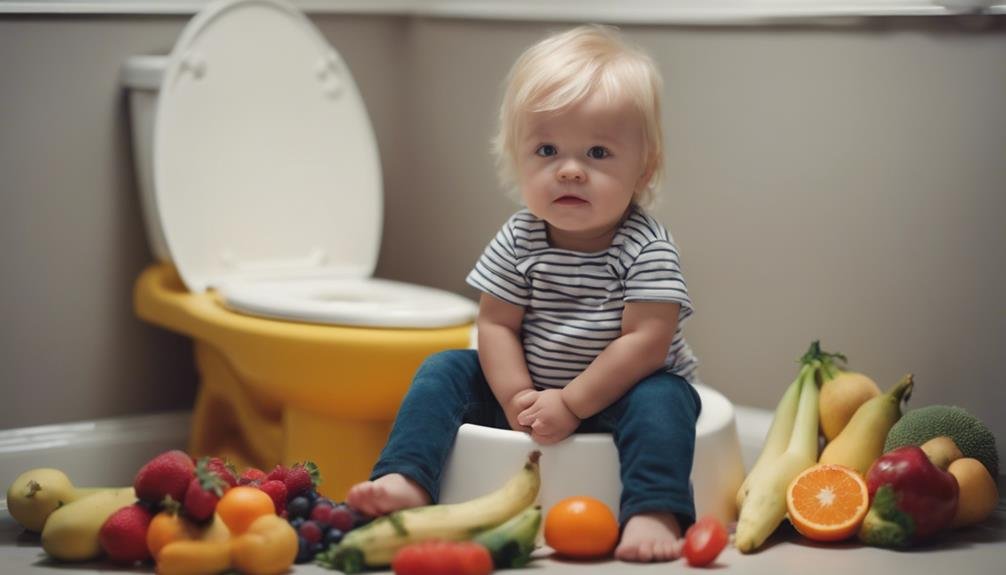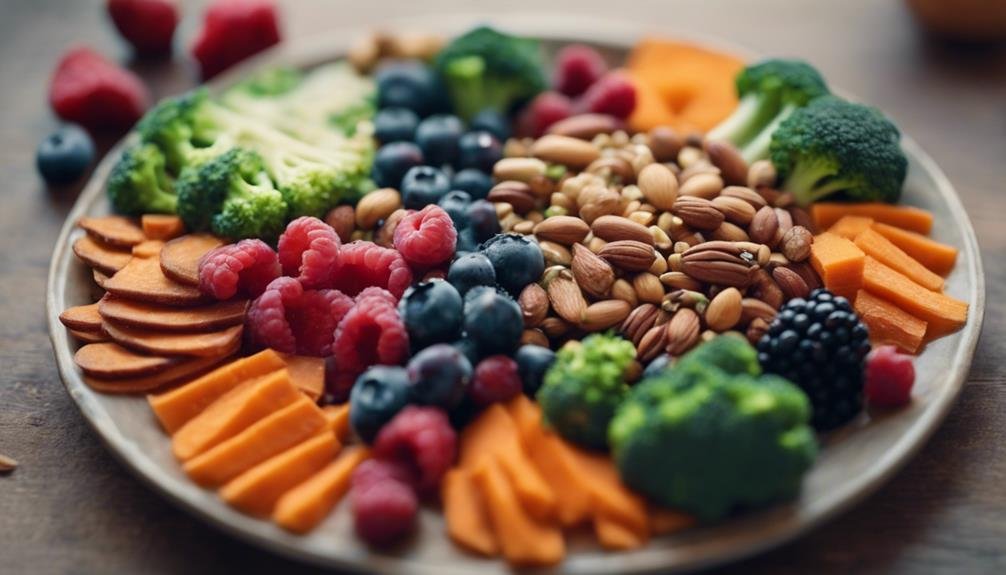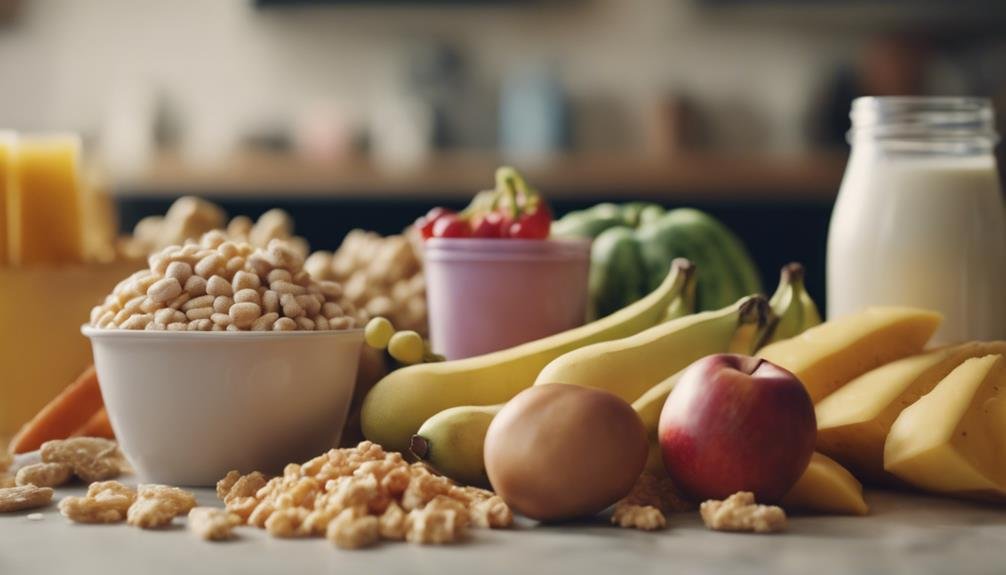"Cherishing Little Steps - A Haven for Baby and Family Journeys"
How to Deal With Toddler Constipation: Dietary Solutions
When it comes to addressing toddler constipation through dietary solutions, the power of proper nutrition cannot be underestimated. Incorporating the right foods can make a significant difference in your child's digestive health, but have you considered the impact of specific food groups beyond fiber-rich options? By exploring a holistic approach to your toddler's diet, you may uncover additional strategies that could alleviate constipation issues and enhance their overall well-being.
Key Takeaways
- Encourage hydration to soften stools and ease bowel movements.
- Introduce fiber-rich foods gradually for better digestion.
- Consider probiotics to support a healthy gut and digestion.
- Limit constipation-causing foods like processed snacks and dairy.
- Opt for fresh, whole foods over processed items for digestive health.
Understanding Toddler Constipation

If your toddler is experiencing difficulty passing stools, it could be a sign of constipation. Constipation in toddlers is a common issue that can be caused by various factors such as diet, hydration, and certain medical conditions. Understanding the signs and symptoms of constipation is crucial for proper management and prevention of further complications.
One of the main indicators of constipation in toddlers is infrequent bowel movements, typically less than three times a week. Your child may also struggle or show discomfort when trying to pass stools. You might notice hard, dry, or pellet-like stools in the diaper, which can indicate constipation. Additionally, your toddler may exhibit signs of abdominal pain, bloating, or even traces of blood on the stool.
It is essential to address constipation in toddlers promptly to prevent it from becoming a chronic issue. By identifying the symptoms early and making necessary dietary and lifestyle adjustments, you can help your toddler find relief and establish healthy bowel habits.
Hydration Importance for Constipation Relief
To effectively address toddler constipation, ensuring adequate hydration is essential for promoting relief and healthy bowel function. Hydration plays a crucial role in softening the stool, making it easier for your child to have regular bowel movements. Encourage your toddler to drink water throughout the day, offering sips frequently, especially if they aren't used to drinking large amounts at once. Including hydrating options like diluted fruit juices or herbal teas can also contribute to their fluid intake.
Dehydration can worsen constipation symptoms, leading to harder and more difficult-to-pass stools. Signs of dehydration in toddlers include dry lips and mouth, decreased urine output, and lethargy. By maintaining proper hydration levels, you can help prevent constipation and promote overall digestive health. Remember to offer fluids regularly, particularly during hot weather or when your child is more active. Hydration is a simple yet powerful way to support your toddler's digestive system and alleviate constipation.
Fiber-Rich Foods for Regular Bowel Movements

Incorporate fiber-rich foods into your toddler's diet to promote regular bowel movements and prevent constipation. Fiber adds bulk to the stool, making it easier to pass through the intestines. Including a variety of fruits, vegetables, whole grains, and legumes in your toddler's meals can significantly increase their fiber intake. Here is a table outlining some fiber-rich foods that you can introduce to your toddler:
| Food | Fiber Content (g) | Serving Size |
|---|---|---|
| Apples | 4.4 | 1 medium |
| Sweet Potatoes | 4.0 | 1/2 cup |
| Oatmeal | 4.0 | 1/2 cup cooked |
| Lentils | 7.8 | 1/2 cup cooked |
These foods are not only delicious but also beneficial for your toddler's digestive health. Remember to introduce fiber gradually into their diet and ensure they drink plenty of water to aid in digestion. By incorporating these fiber-rich foods, you can help regulate your toddler's bowel movements naturally.
Probiotics for Gut Health
Consider introducing probiotics into your toddler's diet to support their gut health and promote a balanced digestive system. Probiotics are live bacteria and yeasts that are good for your child's health, especially their digestive system. Here are some reasons why probiotics can be beneficial for your toddler:
- Balancing Gut Flora:
Probiotics help maintain a healthy balance of good bacteria in the gut, which is essential for proper digestion and overall gut health.
- Improving Digestive Function:
These beneficial microorganisms can aid in breaking down food and absorbing nutrients more effectively, potentially reducing the risk of constipation.
- Boosting Immune System:
A significant portion of the immune system is located in the gut. By supporting gut health with probiotics, you can potentially strengthen your toddler's immune response.
- Alleviating Digestive Discomfort:
Probiotics may help alleviate symptoms of digestive issues like bloating, gas, and abdominal pain in toddlers.
Limiting Constipation-Causing Foods

Introducing a balanced diet with a focus on reducing constipation-causing foods can play a key role in managing your toddler's digestive health. By limiting certain foods in your toddler's diet, you can help prevent constipation and promote regular bowel movements.
Foods that are low in fiber, such as processed snacks, white bread, and sugary treats, can contribute to constipation. Reducing the intake of these items and replacing them with high-fiber alternatives like whole grains, fruits, and vegetables can aid in preventing constipation.
Additionally, dairy products like cheese and ice cream may also lead to constipation in some children. Moderating the consumption of these items and ensuring your toddler stays hydrated can further support healthy digestion.
Furthermore, highly processed foods and fast foods, which are often high in fats and sugars, can slow down the digestive system. Opting for homemade meals with fresh ingredients can be a better choice for your toddler's digestive health.
Frequently Asked Questions
Can Toddler Constipation Be a Sign of a More Serious Health Issue?
Constipation in toddlers can sometimes indicate a more serious health issue. It's essential to monitor your child's symptoms and consult a healthcare provider if you notice persistent or severe constipation that doesn't improve with dietary changes.
How Can I Encourage My Picky Eater to Consume More Fiber?
To help your picky eater get more fiber, try sneaking it into favorite dishes like smoothies or mac and cheese. Add fruits, vegetables, and whole grains creatively. Making mealtimes fun can encourage them to try new foods.
Are There Any Natural Remedies to Help Relieve Toddler Constipation?
For toddler constipation relief, try natural remedies like increasing water intake, offering fruits like prunes or pears, and incorporating high-fiber foods like whole grains. Consult a pediatrician if issues persist.
Should I Be Concerned if My Toddler's Bowel Movements Change in Frequency?
If your toddler's bowel movements suddenly change in frequency, it's wise to monitor closely. Slight variations are normal, but if accompanied by discomfort or other symptoms, consulting a healthcare provider is recommended for peace of mind.
Is There a Specific Age Range When Toddler Constipation Is Most Common?
Toddler constipation is most common between ages 2 and 4. During this time, their diet changes and they might resist drinking enough fluids. This age range often experiences more toilet training stress, contributing to constipation.
Conclusion
In conclusion, by following a diet rich in fiber, staying hydrated, and avoiding constipation-triggering foods, you can ensure your toddler's bowel movements flow smoothly like a river after a storm.
Embrace the power of wholesome foods and watch as constipation becomes a distant memory, leaving your little one feeling light as a feather and ready to conquer the world.
Remember, a happy tummy leads to a happy toddler!



I share your level of enthusiasm for the work you’ve produced. The sketch you’ve displayed is refined, and the material you’ve authored is impressive. Nevertheless, you seem anxious about the prospect of heading in a direction that could cause unease. I agree that you’ll be able to address this concern in a timely manner.